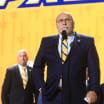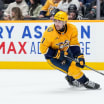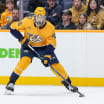Dan Lambert was still in elementary school in Manitoba when his television showed him teenage hockey players parading the Memorial Cup around the ice.
A decade later, he was the one celebrating with the trophy in his hands.
Today, he's in his first season as an assistant coach with the Nashville Predators. Lambert has experienced plenty during his time as a hockey lifer, on the ice first, before stepping behind the bench.
Just like seemingly every kid growing up in Canada, hockey played an important role in Lambert's upbringing, and he's been lucky enough to make a career in the sport. A couple of stops to the Memorial Cup tournament - first as a player, and later as a head coach - are two of the pinnacles of that journey, experiences that have helped shape who he is today.
Memorial Cup Experiences Helped Shape Preds Assistant Coach Lambert
Nashville Assistant Won Memorial Cup as Player with Swift Current, Coached in Final with Kelowna
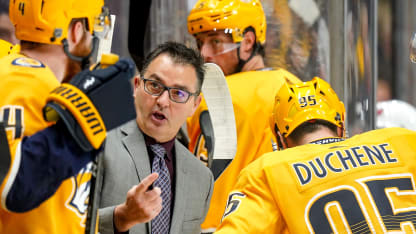
© John Russell/Getty Images
Behind the Stanley Cup Final and the World Junior Championship, the Memorial Cup is just about as big as it gets when it comes to hockey in Canada. The annual tournament pits the champion of each of the top three junior leagues in the country - the Ontario Hockey League, Western Hockey League and Quebec Major Junior Hockey League - against one another. The fourth club in the tournament represents the host city within the Canadian Hockey League, the entity that oversees the OHL, WHL and QMJHL.
Essentially, the Memorial Cup decides the best junior hockey team in all of Canada, and it's a grueling task. Imagine an NHL team winning the Stanley Cup, only to then face three of the other top teams from across the globe.
So, when a 19-year-old Lambert and his Broncos beat the Saskatoon Blades in overtime of the final game back in 1989, it was quite an accomplishment. A defenseman, Lambert was named MVP of the tournament, a bonus to cap off a magical run.
"It was an incredible season," Lambert recalled. "We had a great team, and ironically, the team we ended up beating in the final [the hosting Blades] was a team that we dismantled in the WHL playoffs. We beat them four [times]…but when it came to the tournament…they beat us in the round robin which made us have to play in the semifinal of the tournament. But, for us it was like, 'Oh my gosh, like this isn't the same team that we had success against a few weeks ago.' That was a different challenge, a new challenge."
Swift Current eventually prevailed, and while the win brought jubilation to a small Saskatchewan town, there was also a sense of community pride heightened by tragedy just three years earlier.
In December of 1986, the Broncos' bus crashed on a road trip, taking the lives of four players. Lambert wasn't on the bus, but he was a member of the team, and the event was always on the minds of all who called Swift Current home.
In that way, the victory meant so much more.
"Somehow, someway, we found a way to overcome all of those challenges, and we put Swift Current back on the map," Lambert said. "Everybody remembered Swift Current from the accident and everything else, but I think we were able to put them on the map in a positive light. I know a lot of us took a lot of pride in that."
As every teenager with NHL aspirations does, Lambert moved on from Swift Current following his junior days. He was drafted by the Quebec Nordiques in the 1989 NHL Draft, and he played 29 games with the team over two seasons to begin the 90s decade.
From there, the blueliner had stops in the American Hockey League and the International Hockey League before playing his final 10 seasons in the Deutsche Eishockey Liga in Germany. Following his last campaign with the Hanover Scorpions, it was back to Canada, this time behind the bench as an assistant coach with the Kelowna Rockets.
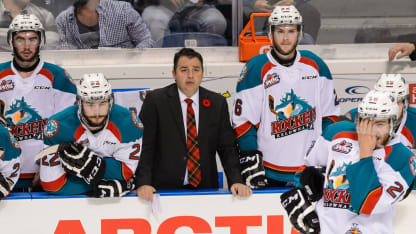
© Minas Panagiotakis
When the 2014-15 season arrived, Lambert took over as head coach of the club, and already a WHL champion as a player, he did it as a bench boss too. Lambert guided his rockets to the 2015 Memorial Cup tournament, a mere 26 years after he did so as a wide-eyed teenager.
In fact, that year's tournament was being held at the Colisee in Quebec City, the same rink Lambert skated in as an NHLer with the Nordiques all those years ago.
"It was a very special moment for me, personally," Lambert said of his return as a coach. "I was able to enjoy it with my wife, and my three daughters were there as well as in Quebec City, and ironically… the final game of the Memorial Cup was going to be the final game in the Colisee, which was really special as well. There were a lot of moments that I was like, 'Wow, I can't believe I'm this fortunate - that I get to coach these young men in the biggest stage in junior hockey.'"
The Rockets ultimately fell in the final of that year's tournament, and while the loss stung, Lambert was still able to appreciate the experience in a different manner - one that allowed him to look back on his life to that point and how he got back to that revered stage.
"As a player, when we were in the moment of playing and even right before overtime [of the Memorial Cup in 1989], there wasn't a second that I thought we were going to lose that game," Lambert said. "Now, fast forward to when I was the coach, and all of the pressures that we had gone through, by the time we got to the Memorial Cup, I felt zero pressure. I was like, 'OK, we know how to win now. We've got this figured out.' Now, I don't want to say I was satisfied, because I certainly was not satisfied. Our goal was to win that last game as well.
"But I felt going into the tournament… 'I'm going to enjoy this moment.' I truly tried to do that, and I believe I did. I was probably more relaxed in the tournament, way more relaxed than I was throughout the playoffs. Which is weird. But that's just the way it was… I just feel like every time you're put in those types of situations, the high-pressure situations, whether you're a player or a coach, it doesn't matter. You learn from them, you grow from them and it prepares you for your next challenge in life or in sports, whatever it may be."
Those Memorial Cup experiences helped Lambert get to where he is today - with an NHL franchise in a city he and his wife were already particularly fond of thanks to their love for country music.
Lambert thinks back to those days often recalling not only what it was like to make it to the Memorial Cup, but to compete for - and on one occasion, win - a championship of that magnitude. The memories help drive him to this day, making him a better coach - and person - who wants the Predators to experience the same.
"When you end up winning at the end of the season, there's so many lessons and so many challenges along the way," Lambert said. "We faced a lot of adversity, and every team that wins does. I think in the end, it really does make you aware and understand that winning doesn't happen easily, and no team that wins ever goes through zero adversity… There were a lot of times throughout my career that you think back to those moments, and you learn a lot from those types of situations.
"But it's a tournament that I feel is a huge part of Canada and a huge part of my past, as a coach and a player. There are great memories, and it's something that I'll never forget being a part of."







